Justice Karnan case to reach climax on Thursday: will SC order his arrest?

The unprecedented contempt case contemplated against a sitting judge of a high court by the Supreme Court of India is all set to reach a climax on 31 March when the contemnor, Justice CS Karnan, currently of the Calcutta High Court, is slated to appear before the apex court.
The contemnor has already rejected the Supreme Court notices as well as an arrest warrant.
It's the first time in the history of the Indian judiciary a sitting HC judge is the contemnor and the Chief Justice of India (CJI) has issued warrants. Another first is that the contemnor has made a criminal complaint against the CJI, his companion justices and the Attorney General, as per the provisions of the SC/ST (Atrocities) Act.
If Justice Karnan does not appear, the SC Bench headed by the CJI has to order for his arrest. If he appears, does not apologise, then too he can be arrested.
In either case, the case will reach its climax on Thursday at the Supreme Court, and it won't be something that'll bring honour to the Indian judiciary.
Constitutional issue
This apart, a constitutional issue would also arise: can a sitting HC judge be hauled up for contempt, leading to his removal? Or should the issue be left to Parliament, known informally as 'impeachment' (the Constitution uses this expression only for the President of India; for others, like SC and HC judges, it uses the expression 'procedure for removal').
The procedure is that for the removal of a high court or Supreme Court judge, a motion should be moved in Parliament, and 2/3rds of the members present and voting would decide his fate.
“This is exactly what happened in the case of a judge who was sought to be removed, but the then-CJI, KG Balakrishnan, only sent a recommendation to the President of India and the Parliament that this procedure be initiated,” says Indira Jaising, senior counsel and the first woman Additional Solicitor General (ASG) of the country.
She is of the opinion that the present controversy over Justice Karnan has been mishandled.
She says that a 'close look' at Justice Karnan's case would established the 'differential treatment' meted out to HC judges – one recommended by the CJI to the President of India and Parliament, another one taking 'suo motu' contempt. This would give Karnan the grounds to to argue that this itself makes it clear that being a Dalit, he is being 'treated differentially'.
On the other hand, nonagenarian lawyer and former Union Law Minister, Ram Jethmalani, says Justice Karnan has 'lost his mental balance' and that he should apologise to the Supreme Court.
Case history
It was former CJI Balakrishnan, himself a Dalit, who elevated Karnan to the Madras High Court bench.
The genesis of the problem was when Justice Sanjay Kishan Kaul, now a Supreme Court justice, was the Chief Justice of the Madras High Court. Karnan accused him of discrimination, as Justice Kaul is a Brahmin from Kashmir, and Karnan a Dalit from Tamil Nadu.
One fine morning, Karnan barged inside the court room of Justice Kaul (leaving his court), and started accusing him, following which he was stripped off his administrative and judicial work by Justice Kaul.
Subsequently, the Supreme Court transferred Justice Karnan to the Calcutta High Court. But there too, Karnan was stripped off his administrative and judicial functions, following the Supreme Court taking suo motu cognisance of contempt of court.
The rest is history: Justice Karnan refused to even accept the contempt notices. He said he could not be proceeded against under the Contempt of Court Act, since he was a high court judge.
Then, the Supreme Court issued bailable arrest warrants, which Karnan refused to accept, and ordered the registration of criminal cases against the CJI, his companion judges in the bench in the matter, and the Attorney General of India, Mukul Rohtagi.
However, under rule 11 of Rules to Regulate Proceedings for Contempt of the Supreme Court, 1975, the Supreme Court may, if it has reasons to believe that the person with contempt is evading service of notice or refusing to accept the notice and fails to appear in person, direct a bailable or non-bailable warrant for his arrest.
Now that a bailable warrant has already been issued and Justice Karnan has refused to accept it, it has to be seen whether the Supreme Court will now issue non-bailable arrest warrants.
In that case, it would be another first – that a sitting HC judge is arrested and brought to SC with or without handcuffs.
First published: 30 March 2017, 17:22 IST
